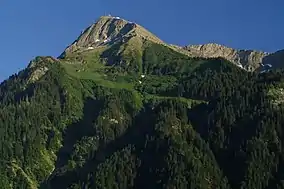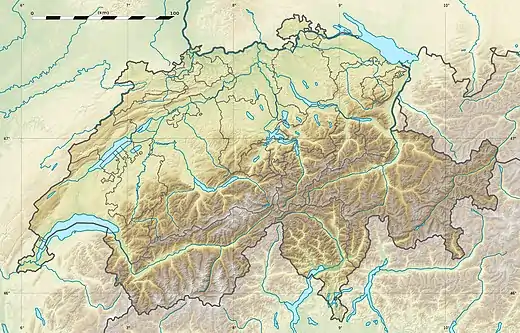| Niesen | |
|---|---|
 The Niesen from Wimmis | |
| Highest point | |
| Elevation | 2,362 m (7,749 ft) |
| Prominence | 407 m (1,335 ft)[1] |
| Parent peak | Albristhorn |
| Isolation | 2.3 km (1.4 mi)[2] |
| Coordinates | 46°38′46″N 7°39′09″E / 46.64611°N 7.65250°E |
| Geography | |
 Niesen Location in Switzerland | |
| Location | Canton of Bern, Switzerland |
| Parent range | Bernese Alps |
| Climbing | |
| Easiest route | Niesenbahn |
The Niesen is a mountain peak of the Bernese Alps in the Canton of Bern, Switzerland. The summit of the mountain is 2,362 metres (7,749 ft) in elevation.
It overlooks Lake Thun, in the Bernese Oberland region, and forms the northern end of a ridge that stretches north from the Albristhorn and Mannliflue, separating the Simmental and Kandertal valleys.[3]
Geography
Administratively, the summit is shared between the municipalities of Reichenbach im Kandertal to the southeast, and Wimmis to the west and north. Both municipalities are in the canton of Bern.[3]
The summit can be reached easily by using the Niesenbahn funicular from Mülenen (near Reichenbach). The construction of the funicular was completed in 1910.
Alongside the funicular is the longest stairway in the world, with 11,674 steps. It is only open to the public once a year for a stair run event.[3][4][5]
Originally the mountains name was Yesen. «An Yesen» transformed to Niesen. Yesen is yellow gentian and still flowers on the Niesen to this day. [6] Because of its shape, the Niesen is often called the Swiss Pyramid. The Niesen may have influenced some modernist paintings by Paul Klee, in which an abstracted pyramidal form is seen.[7]
See also
- Bernese Alps topics
- List of mountains of Switzerland accessible by public transport
- Mountains & peaks of the Alps
- Two-thousanders of Switzerland
References
- ↑ Retrieved from the Swisstopo topographic maps. The key col is located south of the summit on the Niesegrat at 1,955 metres.
- ↑ Retrieved from Google Earth. The nearest point of higher elevation is northeast of the Fromberghorn.
- 1 2 3 map.geo.admin.ch (Map). Swiss Confederation. Retrieved 2014-11-03.
- ↑ "Niesen Funicular Info". Niesenbahn. Retrieved 23 August 2017.
- ↑ "Niesenlauf" [Niesen Stair Run]. niesenlauf.ch (in German). Archived from the original on 24 August 2017. Retrieved 23 August 2017.
- ↑ "Der Niesen" (in German). Niesenbahn. Retrieved 28 March 2020.
- ↑ Rosenthal, Mark. “The Prototypical Triangle of Paul Klee.” The Art Bulletin, vol. 64, no. 2, [Taylor & Francis, Ltd., College Art Association], 1982, pp. 299–310, https://doi.org/10.2307/3050222. “The title Niesen makes explicit another identity of the triangle besides the Egyptian pyramid. "Niesen" is the name of a pyramidally shaped mountain in the Bernese Alps on Lake Thun, not far from Klee's childhood home near Bern. The area was a favorite of Klee's for hiking and vacationing; in 1915 he spent several days with his friend Louis Millet in the town of Gunten, which faces the Niesen from directly across the lake. Klee's study of the mountain from a dramatic vantage point recalls his affirmation, six years earlier, that Cézanne was "the teacher par excellence." As in Cézanne's Mont Ste.-Victoire paintings (Fig. 2), Klee, in Niesen, contrasts the strength of the mountain stretching to the skies with a patchy landscape below.”
External links
- Niesen.ch: Niesen News website—(in English)
- Nesen-funicular.ch: Niesen Funicular website—(in English)
- Hikr.org: Niesen
- Meteocentrale.ch: Current weather data and forecast for Niesen-Kulm—(in English)
The Niesen.
Gallery



